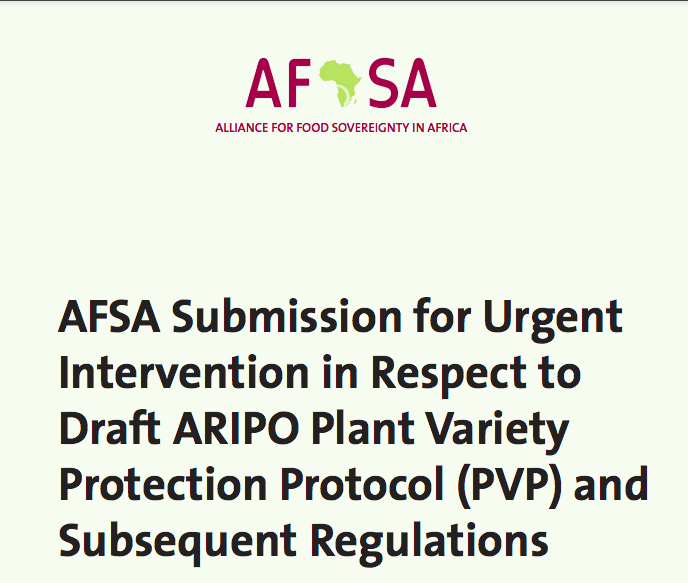Latest Resources

2 August 2024
The decline of FISPs in Malawi – debt, corruption and hunger
What future for smallholder farmers and realising agroecology?

9 December 2020
Neo-colonial economies and ecologies, smallholder farmers and multiple shocks: The case of cyclon...
We are pleased to share with you the second discussion paper in our “Multiple Shocks in Africa Series”, Neo-colonial economies and ecologies, smallholder farmers and multiple shocks: The case of cyclones Idai and Kenneth in Mozambique and Zimbabwe. (Por favor clique aqui para Português). The paper exposes how the two cyclones that battered Mozambique and […]

17 September 2018
The SADC PVP Protocol: Blueprint for uptake of UPOV 1991 in Africa
In the recently published discussion paper, ‘The SADC PVP Protocol: Blueprint for uptake of UPOV 1991 in Africa’, Sabrina Masinjila and Mariam Mayet, provide an updated critique on the regional Plant Variety Protection (PVP) system developed under the auspices of the Southern African Development Community (SADC) – the SADC PVP protocol – adopted by the […]

11 June 2014
AFSA Makes Small Gains for Farmers’ Rights in Draft SADC PVP Protocol
AFSA members participated at a SADC Regional Workshop that took place 13-14 March 2014, in Johannesburg, South Africa. The aim of the workshop was to review the draft SADC PVP Protocol. After marathon, highly contentious and difficult discussions, AFSA members were able to persuade member states to amend key provisions in the draft SADC PVP […]

9 March 2011
How US sorghum seed distributions undermine the FAO Plant Treaty’s Multilateral System
New data from ICRISAT and the US Department of Agriculture and a comparison of genebank records indicates that half of more of ICRISAT’s sorghum genebank collection is also being distributed outside of the Multilateral System. This yawning gap creates an economic incentive for the Multilateral System and its benefit-sharing requirements to be avoided. USDA’s sorghum […]

19 February 2011
Agrochemical giant DuPont to sell Bolivian sorghum gene
In 2012 multinational giant DuPont plans to begin selling sorghum varieties containing a valuable gene taken from a sudan grass that was collected in 2006 in Bolivia. The gene, branded as ‘Inzen A II’, makes sorghum plants tolerant to herbicides made by DuPont and other companies, and was acquired under exclusive license from Kansas State […]

28 October 2010
Synthetic Biology in Africa: Recent Developments
By Gareth Jones and Mariam Mayet The focus of this paper is the emerging field of synthetic biology, in particular its implications for the African continent. Synthetic biology combines a number of scientific disciplines and is generally understood to involve the deliberate design of biological systems, using standardised components that have been created in a […]

4 March 2010
The GM stacked gene revolution: A biosafety nightmare
Stacked GMOs are those containing more than one gene genetically engineered into a crop plant. A controversial stacked GMO, Smarstax containing 8 such genetically engineered genes, was commercially approved in the US, Canada, Japan and South Korea during 2009. Stacked gene varieties are highly complex, posing new biosafety risks that outpace the capacity of regulatory […]

19 June 2009
Revised African Model Law Biosafety Strategy Briefing June 2009
Haidee Swanby of the African Centre for Biosafety attended a meeting hosted by the African Union during May 2009 in Arusha, Tanzania on various biosafety initiatives of importance to the continent. In this briefing paper Haidee discusses the meeting and the issues and challenges lying ahead for the continent. Read here.

11 February 2007
Malawi – GMO Legislation
The government of Malawi published its biosafety draft regulations in The Malawi Gazette Supplement on 13 September 2002 (“biosafety law”), at the height of the GM food aid controversy when several countries in Southern Africa imposed restrictions on the acceptance of genetically modified food aid from the United States. Malawi accepted the GM food aid, […]
